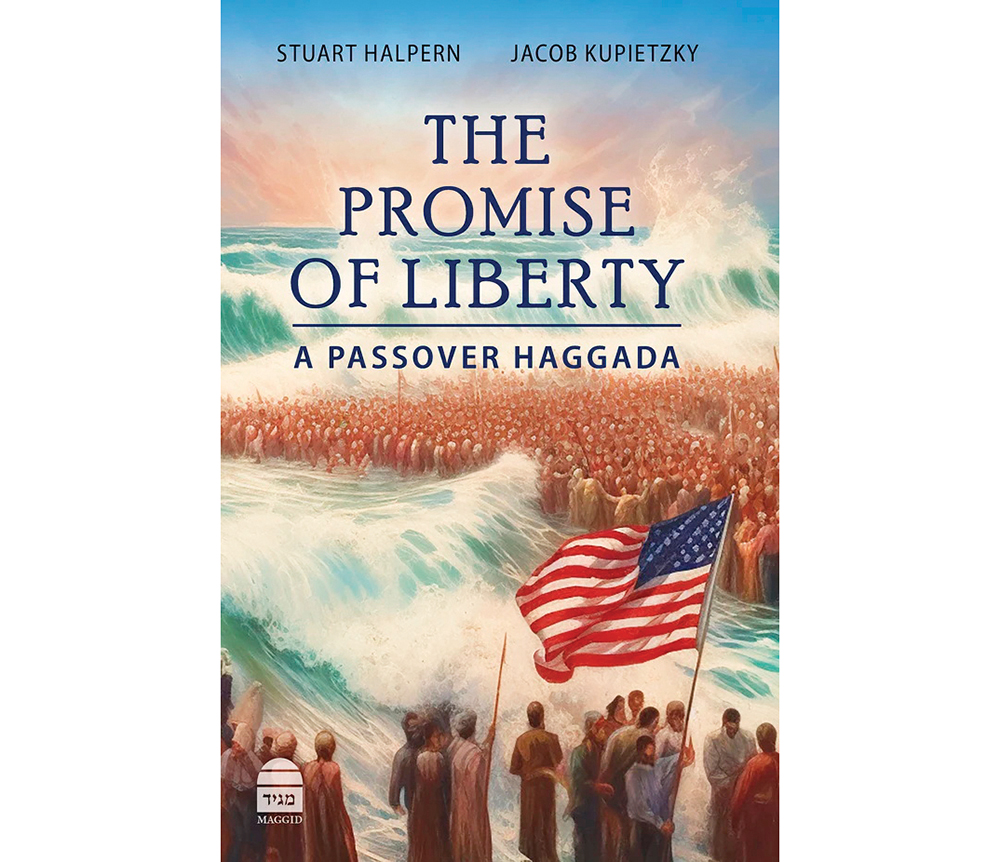
Highlighting: “The Promise of Liberty: A Passover Haggada,” by Stuart Halpern and Jacob Kupietzky. Koren/Maggid. 2024. 264 pages. ISBN-10: 1592646255.
In 1862 during the first Passover of the Civil War, a 19-year-old private by the name of Joseph A. Joel and 20 other soldiers, requested from their commanding officer a relief from their duties in order to celebrate the holiday of freedom. In The Jewish Messenger, Joel recounted that just a few hours before the Seder began, the men received a delivery of matzot, Haggadot and prayer books. In the wild woods of West Virginia, with their weapons by their side in the event of an attack, the men retold the Passover story of the Israelite journey from slavery to freedom.
For generations, the Jewish people have been retelling the story of their ancestors’ redemption from Egypt. The Exodus story has also helped shape many of the values that the United States was established upon, and its themes can be found in the writings and speeches of leading American figures of all backgrounds who have turned to the story for inspiration, from Presidents George Washington and George W. Bush to Martin Luther King Jr., Mark Twain and Sojourner Truth.
Koren Publishers Jerusalem’s newly released “The Promise of Liberty: A Passover Haggada” brings together historical events, speeches and texts from American history that were inspired by the Passover story. These historical references are interwoven alongside the Hebrew text and English translation of the Haggadah, and are accompanied by colorful illustrations and graphics.
American abolitionist and activist Harriet Tubman called the south “the Land of Egypt.” When she was rescuing enslaved people along the Underground Railroad she would sing songs evoking the liberation from Egypt. One of the freedom songs, which begins with the chant “So the God said, ‘Go down, Moses’,” is printed in the Haggadah in the Maggid section.
At the March 26, 1945 annual Passover service at the Jewish Welfare Board in Washington, D.C., President Harry S. Truman addressed those who were assembled with words of praise for the Jewish people who had suffered tremendous loss during the war. Speaking of Hitler, Truman said, “Little did he reckon with the courage and endurance of a race hardened by centuries of oppression, and strengthened by a firm faith that ultimately another Moses must come to lead them out of their modern bondage into the Promised Land.”
American presidents have also drawn inspiration from the Passover story as a model of liberty and freedom not just for individuals of Jewish faith, but for the American people. In his second inaugural address delivered on January 20, 2005, President George W. Bush traced the American ideal of freedom to the giving of the Torah at Mount Sinai. Speeches and writings of nine U.S. presidents appear in the Haggadah, all evoking imagery and themes from the Exodus.
The Haggadah also features essays on various themes of the holiday by American-Jewish thinkers who represent a wide breadth of Jewish life in the United States. In an essay co-authored by the late Senator Joseph Lieberman and Rabbi Menahem Genack, the two men offer words of inspiration to a people longing for redemption. Their piece opens with a recounting of different times in history when the Jewish people have recited the Haggadah under persecution. “The Haggadah is telling us that though externally we may be in chains, internally and existentially we are free because of our confident belief in redemption,” they write. “We know that the future redemption is at hand and that the era of our final freedom is about to be realized.” Dr. Martin Luther King Jr. embodied this belief. In his “I have a dream” speech, they write, Dr. King knew that dreams have the power to transform reality into what the world ought to be.
The Haggadah is the brainchild of Rabbi Dr. Stuart Halpern and Jacob Kupietzky. Halpern, who made aliyah three years ago from Englewood and serves as the senior adviser to the provost and deputy director of the Straus Center for Torah and Western Thought at Yeshiva University, explained that this Haggada was driven by a vision to inspire American Jews by better understanding the impact the Exodus story has had on American thought. “Across all perceived divides, the story of Pesach has been a unifying national narrative of the United States,” he said.
One of the historical pieces in the Haggadah that most resonates with Halpern is Frederick Douglass’ speech delivered in the early 1850s in front of some 600 people, including the President Millard Fillmore. Douglass, an abolitionist, orator and writer, laments that Americans are celebrating July 4 while there are enslaved people living in shackles on plantations. Douglass, a former slave, quotes from the book of Exodus as an ethical rebuke to the American people who have allowed this injustice to continue. According to Halpern, “The speech is an extremely powerful call through the prism of Passover for America to live up to its biblical ideals.”
While the Haggadah can be enjoyed by people of all ages, it was designed especially with the young TikTok generation in mind, as is evidenced by the great attention to graphic design. The Haggadah is also aimed at educating broader American society of the important influence Jewish people have had on the development of the country and its founding principles. Halpern emphasizes how important it is for Americans to be aware of this history, especially during this time of rising antisemitism and heightened political tensions post-October 7.
To order the Haggadah go to https://korenpub.com/products/the-promise-of-liberty
Alisa Bodner is a Fair Lawn native who immigrated to Israel over a decade ago. She is a nonprofit management professional who enjoys writing in her free time.







